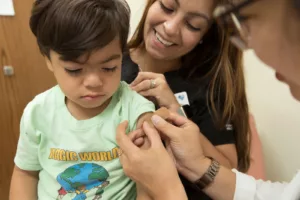“The Importance of Immunization and Vaccinations for Kids” is a comprehensive article that addresses a wide range of health topics related to children. It provides valuable information on issues such as anxiety, exercise for asthmatic children, bedwetting, and various contagious illnesses like chickenpox and conjunctivitis. The article also covers important aspects of children’s dental care, the benefits of physical activity, and mental health problems that kids may face. In addition, it emphasizes the significance of immunizations and vaccinations in protecting children against harmful diseases. The content further offers a symptom checker and a health service finder tool to assist parents in ensuring the well-being of their children.
The Importance of Immunization and Vaccinations for Kids
In today’s world, where numerous contagious diseases pose a threat to children’s health, immunization and vaccinations play a pivotal role in ensuring their overall well-being. By strengthening their immune systems and providing protection against vaccine-preventable diseases, these interventions are crucial for safeguarding children’s health and preventing the widespread transmission of infectious diseases. This article explores the basics, science, benefits, risks, and future of immunization and vaccinations, emphasizing the significance of following recommended vaccination schedules and the role of parents, caregivers, schools, and healthcare professionals in promoting immunization.
Understanding the Basics of Immunization and Vaccinations
Immunizations and vaccinations are preventive measures that involve the administration of vaccines to stimulate the body’s immune system, enabling it to recognize and combat specific diseases. Vaccines contain weakened or inactivated versions of pathogens or their parts, which trigger an immune response without causing the disease itself. The immune response results in the production of antibodies and memory cells that provide long-term protection against future exposure to the actual disease.
Vaccinations work by introducing an antigen, a substance that stimulates the production of antibodies, into the body. These antibodies are specific to the pathogen targeted by the vaccine, allowing the immune system to quickly and effectively respond when exposed to the actual disease-causing agent. This process creates immunity, which prevents or reduces the severity of the disease if the individual encounters it in the future.
There are two main types of immunization: active and passive. Active immunization occurs when a person’s immune system is activated to produce antibodies in response to a vaccine. It provides long-term protection and can be achieved through various vaccines, such as those administered during childhood. Passive immunization, on the other hand, involves the direct administration of antibodies obtained from another individual or animal. Although passive immunization provides immediate protection, it is temporary and typically used in specific situations, such as when immediate protection is required or when an individual’s immune system is compromised.
Common types of vaccines for children include those for diseases like measles, mumps, rubella, polio, diphtheria, tetanus, pertussis (whooping cough), and influenza. These vaccines have been extensively studied, tested for safety and efficacy, and are recommended by healthcare organizations worldwide.

The Science Behind Immunization and Vaccinations
Immunization harnesses the power of the immune system, a highly complex network of cells, tissues, and organs that work together to defend the body against harmful pathogens. The immune system produces molecules called antibodies that specifically recognize and neutralize antigens present on pathogens, preventing their entry into cells and eliminating them from the body.
When a vaccine is administered, it contains antigens that mimic those found on the actual pathogen. The antigens provoke an immune response, triggering the production of antibodies. These antibodies remain in the body even after the initial immune response, providing a rapid and effective defense mechanism if the individual encounters the disease-causing pathogen in the future.
In addition to stimulating the production of antibodies, vaccines also promote the development of immune memory cells. These cells “remember” the pathogen, allowing the immune system to respond more quickly and robustly upon re-exposure. This memory response provides long-term protection against the disease and reduces the severity of symptoms if infection occurs.
Herd immunity, also known as community immunity, is another important concept in immunization. It occurs when a significant portion of a population is immune to a particular disease, either through vaccination or prior infection. Herd immunity protects individuals who cannot be vaccinated due to medical reasons or those who have not yet received the vaccine, such as infants. When a high percentage of the population is immune, the disease cannot easily spread, reducing the risk of outbreaks and protecting vulnerable individuals.

The Benefits of Immunization and Vaccinations
Immunization and vaccinations offer a wide range of benefits, both at an individual and population level. These include the prevention of vaccine-preventable diseases, reducing the spread of infectious diseases, saving lives, and cost-effectiveness.
Vaccine-preventable diseases, such as measles, polio, and pertussis, can cause severe illness, complications, and even death. Immunization is the most effective way to prevent these diseases and their associated complications. By providing immunity against these pathogens, vaccines protect children from suffering the debilitating effects of these diseases and help maintain their overall health and well-being.
In addition to protecting vaccinated individuals, immunization also plays a crucial role in reducing the spread of infectious diseases. When the majority of the population is immune, the disease has fewer opportunities to spread, breaking the chain of transmission. This is particularly important for diseases with a high transmission rate, as it prevents outbreaks and protects vulnerable individuals who are unable to receive vaccines.
By preventing serious illness, complications, and even death, immunization saves lives. Vaccines have played a significant role in eradicating diseases such as smallpox and have drastically reduced the global burden of diseases like polio. The consistent use of vaccines has the potential to prevent millions of deaths worldwide each year.
Immunization is also cost-effective from a societal perspective. The cost of providing vaccines and implementing immunization programs is significantly lower than the economic burden associated with treating vaccine-preventable diseases. By preventing illness, immunization reduces healthcare costs, hospitalizations, and the need for long-term care. This, in turn, contributes to the overall well-being and productivity of individuals and societies.
The Risks and Side Effects of Immunization and Vaccinations
While the benefits of immunization far outweigh the risks, it is essential to acknowledge and address potential side effects and rare risks associated with vaccinations. Common side effects, which are usually mild and temporary, may include pain or swelling at the injection site, low-grade fever, and mild rash. These side effects generally resolve on their own without any intervention.
Managing and treating vaccine side effects is relatively straightforward. Over-the-counter pain relievers and applying a cold compress to the injection site can help alleviate discomfort. It is crucial for healthcare providers to educate parents and caregivers about the normal side effects and when to seek medical attention if the symptoms persist or worsen.
Rare risks and adverse reactions to vaccines exist but are extremely uncommon. These risks can include allergic reactions, although they are typically mild and easily treatable. Serious adverse events are extremely rare and often associated with underlying health conditions or individual susceptibilities. Rigorous testing and ongoing surveillance ensure that vaccines approved for public use are safe and effective.
Addressing vaccine safety concerns is vital for maintaining public trust and confidence in immunization programs. Healthcare professionals and authorities play a key role in providing accurate, evidence-based information about the safety and effectiveness of vaccines. Clear communication and transparency regarding the risks, benefits, and rare side effects of vaccines are essential for informed decision-making and maintaining high immunization rates.

The Importance of Following the Recommended Vaccination Schedule
Following the recommended vaccination schedule is crucial for ensuring maximum protection against vaccine-preventable diseases. Timely vaccinations are essential to achieve optimal immune response and to protect children during vulnerable periods in their lives.
The recommended vaccine schedule outlines the specific ages at which vaccines should be administered, with some vaccines requiring multiple doses for full immunity. Delaying or missing doses can compromise an individual’s immunity and increase their vulnerability to the targeted diseases.
Each vaccine has specific timing requirements, allowing for the most effective immune response and building immunity before potential exposures. The recommended schedule takes into account an individual’s age, allowing vaccinations to be tailored to their developmental stage and risk of exposure to certain diseases.
It is important to note that catch-up vaccinations are available for individuals who have missed one or more doses. These catch-up vaccinations ensure that individuals are brought up to date with their immunizations and that they receive the necessary protection against vaccine-preventable diseases.
By strictly adhering to the recommended vaccination schedule, parents and caregivers can provide their children with the best chance of developing strong immunity and long-term protection against diseases that can have severe consequences on their health and well-being.
Herd Immunity and its Role in Protecting Children
Herd immunity is a critical concept in immunization, as it plays a significant role in protecting vulnerable individuals who cannot receive vaccines, such as infants or individuals with medical conditions that contraindicate vaccination. It occurs when a significant proportion of the population is immune to a particular disease, reducing the likelihood of outbreaks and providing indirect protection to those who are not immune.
When a high percentage of a population is immunized, the disease-causing pathogen cannot easily spread from person to person. This decreases the number of people available for the pathogen to infect, dramatically reducing its transmission within the community. As a result, even individuals who are not vaccinated, due to medical reasons or age, are shielded from the disease by the surrounding immune individuals, establishing a protective shield around the vulnerable members of the population.
Herd immunity is particularly important for effectively controlling diseases that are highly contagious, have severe consequences, or lack effective treatments. Diseases like measles and pertussis require high vaccination rates to achieve herd immunity due to their high transmission rates. By maintaining high vaccination rates, communities can protect those who cannot be vaccinated, including children who are too young to receive certain vaccines.
Herd immunity is not an infallible shield against diseases, as outbreaks can still occur if immunity levels drop below the necessary threshold. Continued vaccination efforts and a commitment to the recommended vaccine schedule are crucial for maintaining the protective effects of herd immunity.

Common Myths and Misconceptions about Immunization and Vaccinations
Despite the overwhelming scientific evidence and widespread success of immunization programs, there are common myths and misconceptions that persist regarding vaccines. It is important to address these misconceptions and provide accurate information to ensure informed decision-making and maintain public trust in immunization.
One common myth is the link between vaccines and autism. Extensive research has debunked this claim, with numerous large-scale studies finding no causal relationship between vaccines and autism. The original study linking vaccines to autism has been discredited and retracted, and the scientific consensus supports the safety of vaccines in relation to autism spectrum disorder.
Another misconception revolves around vaccine ingredients and their safety. Vaccines contain small amounts of various substances, such as preservatives and adjuvants, which help enhance immune responses and ensure vaccine stability. These ingredients undergo rigorous testing and are regulated to ensure safety. The amounts used in vaccines are negligible and pose no significant risk to health.
The notion of vaccine overload, where administering multiple vaccines overwhelms the immune system, is also a common misconception. The human immune system is capable of handling exposure to numerous antigens simultaneously. Vaccines contain only a fraction of the antigens encountered in daily life, and the immune system is well-equipped to respond to these stimuli without compromising overall health.
Another myth is the idea that natural immunity acquired through contracting the disease is superior to vaccination. While natural immunity can provide protection against re-infection, it comes at a significant cost. Contracting the actual disease poses a far greater risk of severe illness, complications, and even death compared to the minimal risks associated with vaccines. Vaccination provides a safe and effective means of developing immunity without going through the potentially harmful consequences of the actual disease.
The Role of Parents and Caregivers in ensuring Immunization
Parents and caregivers play a pivotal role in ensuring that children receive the necessary immunizations. By educating themselves about vaccines, partnering with healthcare providers, keeping track of vaccination records, and addressing vaccine hesitancy and concerns, parents and caregivers can actively contribute to their children’s health and well-being.
Educating themselves about vaccines is the first step for parents and caregivers in understanding the importance and safety of immunizations. Reliable sources, such as healthcare professionals and reputable websites, can provide accurate information, clarify misconceptions, and address any concerns. By being informed, parents and caregivers can make informed decisions about vaccinating their children.
Partnering with healthcare providers is vital for parents and caregivers to stay updated on the recommended vaccination schedule and receive professional guidance. Healthcare professionals can answer questions, provide accurate information, and address any concerns specific to the child’s health or individual circumstances. Building a trusting relationship with a healthcare provider ensures that parents and caregivers receive reliable and personalized advice regarding immunizations.
Keeping track of vaccination records is essential for ensuring that children receive the appropriate vaccines at the right time. Maintaining accurate records allows parents and caregivers to have a clear overview of the child’s immunization history and identify any missed doses or required catch-up vaccinations. This information is crucial for maintaining optimal immunity and preventing any gaps in protection.
Addressing vaccine hesitancy and concerns is an important role for parents and caregivers. Some individuals may have reservations or concerns about vaccines, often due to misinformation or fear of side effects. By addressing these concerns and providing evidence-based information, parents and caregivers can help alleviate fears and make informed decisions that prioritize the child’s health. Open and respectful communication is key to addressing vaccine hesitancy and ensuring that children receive the protection they need.

The Involvement of Schools and Healthcare Professionals in Immunization
Schools and healthcare professionals play a significant role in promoting and facilitating immunization efforts. By educating students, parents, and staff about the importance of immunization, partnering with healthcare providers, and providing resources and support, schools contribute to ensuring high vaccination rates and maintaining a healthy environment for students and staff.
Schools act as an educational hub and can play a vital role in increasing immunization awareness. By disseminating accurate information about vaccines, their benefits, and the importance of adherence to the recommended vaccination schedule, schools can help combat vaccine misinformation and encourage vaccination among students and their families. Schools can also collaborate with healthcare professionals to organize immunization clinics, making it convenient and accessible for students to receive vaccines.
Healthcare professionals are essential partners in immunization efforts, providing expertise, guidance, and support. They are responsible for assessing and administering vaccines, monitoring immunization status, and maintaining accurate records. By offering evidence-based information and personalized advice to parents and caregivers, healthcare professionals can help address concerns and promote the importance of immunization. Collaboration between schools and healthcare professionals can further strengthen immunization efforts, ensuring that students receive the necessary vaccines and that their immunization records are up to date.
The Future of Immunization and Vaccinations
Advancements in vaccine technology and ongoing research hold promising prospects for the future of immunization. Scientists are continuously working to develop more effective vaccines with enhanced safety profiles, improved delivery methods, and broader protection against a wider range of diseases. Additionally, efforts are underway to develop vaccines that target emerging diseases and address ongoing global health challenges.
Advancements in vaccine technology include the use of novel platforms, such as mRNA vaccines, which have shown great success in the development of COVID-19 vaccines. These platforms have the potential to revolutionize vaccine production, allowing for quicker development and deployment of vaccines in response to emerging diseases.
With the ongoing threat of emerging diseases, vaccination strategies will continue to evolve to combat these new challenges. Collaborative efforts between researchers, healthcare professionals, and policymakers are crucial for staying one step ahead of emerging diseases and implementing effective interventions through immunization.
Global efforts in vaccination campaigns are also vital for achieving equitable access to vaccines and ensuring that vulnerable populations receive the protection they need. Collaboration between countries, organizations, and healthcare providers can help overcome barriers to vaccination, such as vaccine hesitancy, logistical challenges, and inadequate access to healthcare. By working together, the global community can strive towards universal vaccinations and significantly reduce the burden of vaccine-preventable diseases worldwide.
In conclusion, immunization and vaccinations are essential for safeguarding children’s health and minimizing the impact of vaccine-preventable diseases. Understanding the basics, science, benefits, risks, and future of immunization is crucial for parents, caregivers, schools, and healthcare professionals. By following the recommended vaccination schedule, ensuring high vaccination rates, and addressing concerns and misconceptions, individuals and communities can contribute to maintaining optimal health and well-being for children through immunization.
